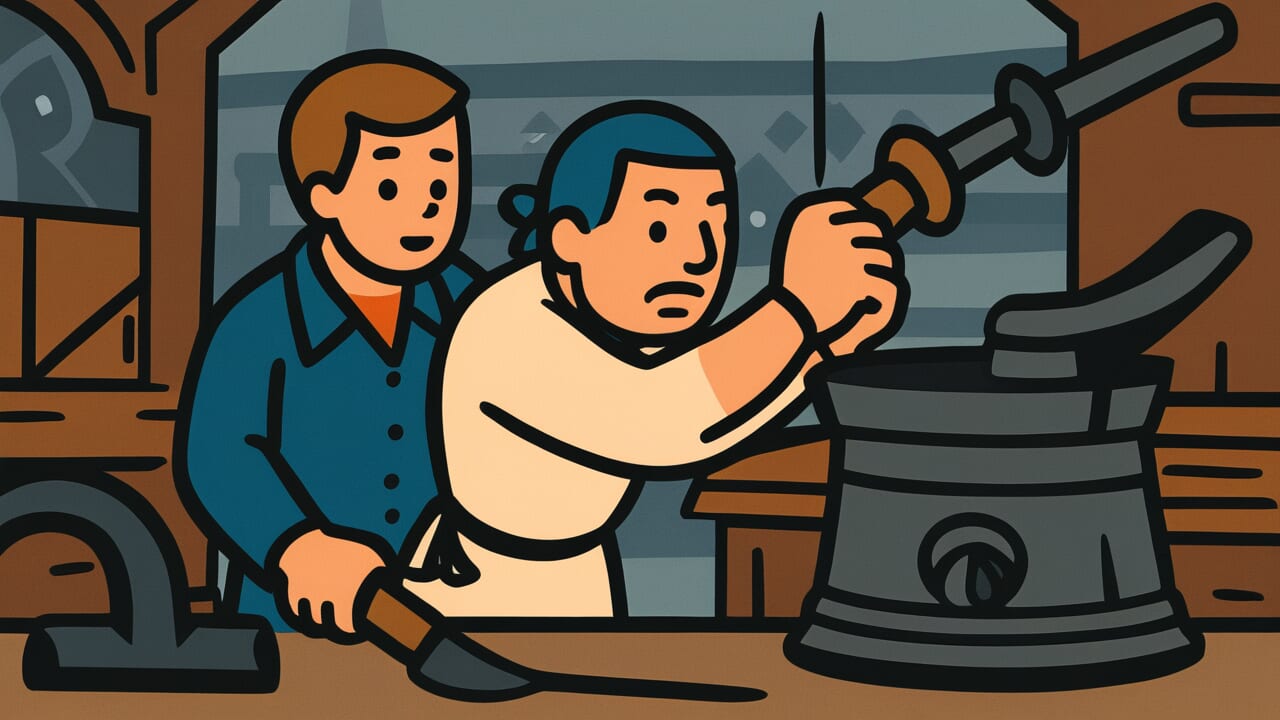How to Read “Don’t blame the blacksmith without sharpening”
Togazu ni kaji wo uramuna
Meaning of “Don’t blame the blacksmith without sharpening”
This proverb warns against blaming others for poor results when you haven’t done your own work first. It’s natural for blades to lose their sharpness with use. Sharpening and maintaining them is the user’s responsibility.
Blaming the blacksmith for a dull blade without sharpening it yourself is completely unreasonable. The craftsman did their job. Now it’s your turn to do yours.
Today, this applies when students blame teachers for bad grades without studying. Athletes blame coaches for losses without practicing enough. Workers blame bosses or circumstances for failures without proper preparation.
The proverb teaches the importance of fulfilling your own responsibilities first. Before criticizing others, you should reflect on whether you’ve done what you were supposed to do.
Origin and Etymology
The exact first written appearance of this proverb is unclear. However, its structure suggests deep connections to Japan’s traditional blacksmithing craft.
“Sharpening” means polishing a blade with a whetstone to restore its cutting edge. “Blacksmith” refers to the craftsman who makes blades like swords and kitchen knives.
When a blacksmith finishes a blade, it’s in perfect condition. But with use, it inevitably becomes dull. At that point, the user must sharpen it themselves.
Neglecting this maintenance and then blaming the craftsman by saying “This blade doesn’t cut well because the blacksmith’s skill was poor” is completely wrong. This is the core teaching of the proverb.
Japan has long had a culture of caring for blades. Users maintaining their own tools was considered a natural responsibility. The blacksmith does excellent work, but maintenance afterward is the user’s job.
This clear division of roles evolved into a broader life lesson. It became a warning against blaming others without fulfilling your own responsibilities. This expression is uniquely Japanese, born from a culture where craftsmanship was deeply valued.
Usage Examples
- You didn’t study at all before the exam, so don’t blame the blacksmith without sharpening—you can’t say the teacher’s instruction was bad
- Criticizing the client after failing a business meeting due to poor preparation is like don’t blame the blacksmith without sharpening
Universal Wisdom
This proverb has endured because it addresses a deep human psychological tendency. When facing failure or unwanted results, we find it incredibly difficult to accept our own responsibility.
Everyone resists admitting their lack of effort or preparation. Doing so feels like denying our own abilities and attitudes, which hurts our self-esteem.
On the other hand, blaming others or circumstances protects us. Saying “the tools were bad,” “the teaching was poor,” or “I was unlucky” keeps our self-worth intact.
But our ancestors understood that this psychological escape route is actually the greatest obstacle to human growth. By using the concrete example of a blacksmith, they made the division of responsibility crystal clear.
The blacksmith fulfilled their responsibility by making the blade. Now it’s the user’s turn to fulfill their responsibility by sharpening it. This role division is obvious, leaving no room for excuses.
The universal wisdom here teaches the principle of personal responsibility. Blaming others might ease your mind temporarily, but it never solves the real problem.
Accepting your responsibility and taking action on what you can control—this attitude is the only path to growth. This proverb speaks this truth quietly but powerfully.
When AI Hears This
When the human brain searches for causes of failure, blaming others or tools is overwhelmingly easier than examining your own actions. Psychology calls this “self-serving bias.”
Success is your achievement, failure is someone else’s fault. This asymmetry is fascinating because it’s deeply connected to brain energy consumption.
Admitting your lack of effort requires reviewing all your past judgment errors. You must repeatedly recall “the self who didn’t sharpen,” reflect, and change behavior. This is high-cost work for the brain.
But thinking “the blacksmith made a bad blade” requires no revision of your memories or judgments. One external factor explains everything. The brain always prefers energy-saving mode, so it naturally chooses the latter.
Even more interesting is how this attribution pattern connects to “sense of control.” Sharpening is something you can control. But admitting this means facing the shame of “I could have done it but didn’t.”
Humans tend to avoid shame more strongly than helplessness. So the resignation of “the tool was bad anyway” is psychologically easier.
This proverb becomes a device that instantly exposes the structure of excuses by showing the concrete action of “sharpening.” It reveals the cognitive trap in a single moment.
Lessons for Today
What this proverb teaches you today is how to take back control of your life.
We face various difficulties and failures every day. Blaming circumstances or others is easy. But that leaves you forever a victim of your situation.
This proverb suggests a more powerful way to live. First, thoroughly do everything within your control. This is the attitude it promotes.
Modern society overflows with information and opportunities. But at the same time, there are infinite materials for excuses. “No time.” “Bad environment.” “Not enough support.”
But have you truly fulfilled your own responsibilities? Have you done the basic maintenance of sharpening the blade?
This question isn’t meant to blame you. Rather, it’s meant to empower you. Because by recognizing your sphere of responsibility and acting on it, you gain the power to change your situation.
You can’t change others, but you can change yourself. First, sharpen. That single step becomes the driving force that moves your life forward.



Comments